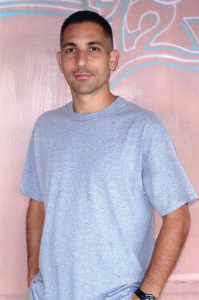Softball Evangelism

In Their Own Words:
Humanists Discuss Their Paths to Humanism
LAST YEAR, the Saints Prison Ministry softball team came to Sheridan Federal Correctional Institution in Oregon. Based out of Moorestown, New Jersey, the Saints usually spend a few weeks each summer on the road, visiting prisons in different parts of the country to play softball and proselytize. This trip brought them to the Northwest; before stopping at Sheridan they’d visited Clallam Bay, Stafford Creek, and Large Mountain—all prisons in Washington state. I was lucky to be selected for the Sheridan All-Star team assembled to play the Saints. Knowing that they are a Christian prison ministry organization concerned me. But I figured there wouldn’t be a whole lot of time for the Saints to be preaching and praying during the game. And I speculated there were probably some creative ways to deal with that kind of thing if it did occur, so I decided to give it a whirl.
For the Saints, the whole mission is really less about the softball than it is about witnessing their religion to prisoners. But they effectively combine the fun of softball with what’s important to them—Jesus—and couple these with the noble cause of prisoner outreach. As a result, their cups overflow with personal fulfillment.
I was the lone humanist on the roster. I don’t believe in the Jesus that motivates the Saints in their work. But I still wanted to be part of the experience without compromising my beliefs. I spoke with my fellow humanists during our weekly meeting about what I should do in the event of a group call to prayer. We agreed that either I could politely excuse myself or, if given the opportunity, I could lead the benediction.
Game day was a lot of fun, not just for the players but also for the incarcerated spectators who appreciated the break from the norm. We put on a good show, and our Sheridan All-Stars won both games. During play, a couple of Saints players distributed tracts containing the Gospel of John and little blue prayer request cards. After the games were finished, the Saints awarded offensive and defensive MVP’s with flashy New Testament Bibles and books containing professional athletes’ spiritual testimonials. Then came the anticipated call to prayer, participation in which the Saints’ players made clear was voluntary. I was glad they didn’t ask volunteers to lead the prayer because I had nothing prepared, and I probably would have impulsively jumped in with some nonsense. However, I did excuse myself from the prayer circle, and most of my teammates were aware of my reasons for doing so. I stepped back, removed my hat, and patiently waited for them to get through their supplication. As this was happening, my humanist buddies Joe and Robin wandered by and with not-so-quiet cheers and applause they expressed their solidarity with me for standing apart.
The Saints then invited everyone down to the chapel for donuts and gospel. This too was voluntary, but I decided to go because 1) it was the least I could do to show appreciation for them coming 2,000 miles to visit us; 2) I’m curious to learn if there are methods that work for evangelicals that could be repurposed for humanism; and 3) donuts! The testimonials amounted to thanking God and wishful thinking that things would be better once a person dies and goes to heaven. Then came the invitation to accept Jesus as a personal savior, followed by a closing prayer. Again, I chose not to pray with everyone else. But this time one of my teammates opted out as well. I wondered if maybe he was emboldened to make his stand because of my earlier display. Turns out he’s a Satanist who likes donuts just as much as me!
There was no time to mingle after the service and no time for anyone to ask me why I chose not to pray. If given the opportunity, I would have said that I chose not to pray because I’m a humanist. I don’t pray to God because I don’t believe in God; I believe in people. I would have thanked the person for being motivated by his faith plus a desire for fun and outreach to visit and show a genuine interest in us prisoners. As a humanist, I am grateful to the Saints for being compassionate people who reach out to help in the best way they can think of.
